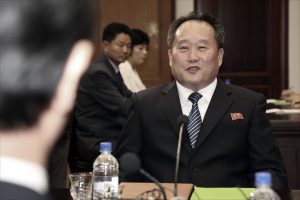The North Korean ranks underwent a shake up last week when Ri Son Gwon, a former military commander, was appointed as Pyongyang’s new foreign minister. Little is known about the retired officer other than his penchant for rude comments and rash behavior when he participated in talks with South Korea in 2018. Some, including the State Department’s top Asia policy official, have suggested that Ri’s appointment could herald a “positive” change in the North’s willingness to negotiate on its nuclear weapons program.
Reality, however, tells a much different story: North Korean leader Kim Jong Un is not only further distancing himself from negotiations with the United States, but is no longer interested in discussing denuclearization at all — assuming he was ever interested in the first place.
One doesn’t need to be a scholar of the reclusive nation to understand talks have been in a jam since U.S. President Donald Trump walked away from his second summit with Kim over 10 months ago without a deal. Even before the North Korean leader excoriated Washington during the Workers’ Party plenum last December, representatives across Pyongyang’s bureaucracy were declaring denuclearization a dead letter. The latest confirmation of that was expressed just last week by a North Korean policy official who repeated Kim’s mantra weeks earlier that, “If the U.S. persists in such hostile policy towards the DPRK there will never be the denuclearization of the Korean Peninsula.” To demonstrate just how serious the regime was, Kim decided to lift the nuclear and long-range missile test moratorium that has been in place since April 2018.
As the North sees it, the benefits of eliminating its nuclear deterrent are simply not worth the costs. No security assurance the United States can offer will match the security benefits a nuclear deterrent can provide. Kim is simply unwilling to make the trade.
Much of Washington perceives Kim’s headstrong resistance as evidence of his irrationality. This is a complete misreading of the situation and helps explain why Washington’s North Korea policy has been so unsuccessful over the last two decades.
Rather than acting irrationally, Kim’s refusal to denuclearize is more an illustration of his concern about how the dynasty his grandfather and father built would survive without a nuclear deterrent. Washington’s policy of regime change in multiple countries, from Iraq in 2003 to Libya to 2011, persuaded the North that U.S. adversaries who don’t have the world’s ultimate weapon are at extreme risk of being deposed. The Trump administration’s targeted killing of Quds Force commander Qassem Soleimani likely solidified this view among the North Korean elite. It’s difficult to envision Washington taking similar measures in Iraq, Libya, and Iran if those states possessed nuclear weapons.
While Secretary of State Mike Pompeo may be acting hopeful Kim wakes up one morning and decides to negotiate his nuclear program away, administration officials are skeptical in private that any of this possible. History is with the skeptics: other than South Africa at the end of the apartheid era, no country has built nuclear warheads only to give them away. North Korea, of course, is no South Africa. Denuclearization was likely off the table the moment Kim’s late father, Kim Jong Il, ordered the very first underground nuclear test over 13 years ago.
U.S. policymakers need to operate in the world as it is, not the world they wish it will be. The Trump administration can demand that North Korea eliminate its nuclear warheads and infrastructure until it’s blue in the face. The result will still be the same.
This will come as a shock to the Beltway, but denuclearization is ultimately the wrong priority. Instead of banging its head against the wall, Washington should do a total overhaul of its goals and concentrate on what is most important: supporting an inter-Korean detente and ensuring the Korean Peninsula is stable enough where the clouds of hostility disappear.
Rather than holding inter-Korean relations hostage in pursuit of a fantasy objective, the Trump administration can stop being an obstacle and start facilitating South Korean President Moon Jae-in’s peace overtures to the North.
This would mean supporting Seoul’s desire to gradually tear down the walls of hostility that have separated the two Koreas for over 70 years and further integrate the peninsula. Instead of threatening South Korea about possible sanctions, Washington should provide Seoul with the flexibility to implement the kinds of economic and infrastructure projects Moon has been promoting throughout his tenure. It means providing the Moon administration with more room to work with the North Koreans diplomatically instead of complaining about Seoul taking matters into its own hands. Preventing North and South Korea from improving bilateral relations, formalizing and regularizing their channels of communication, and reducing the overall temperature only further distances the possibility of a rapprochement — a rapprochement that would also benefit the United States.
Just as importantly, refocusing priorities will require Washington to center attention on agreements the North Koreans may actually be willing to explore. While denuclearization may be dead, Kim Jong Un has never ruled out discussions on a more traditional arms control accord.
The United States has been living with a nuclear North Korea for over 13 years. Thanks to its unrivaled military power, it can continue to do so. What the United States can’t risk living without is peace and predictability on the Korean Peninsula.
Daniel R. DePetris is a fellow at Defense Priorities and a columnist for the Washington Examiner.
































